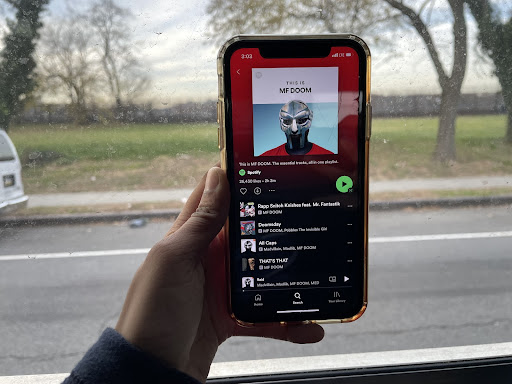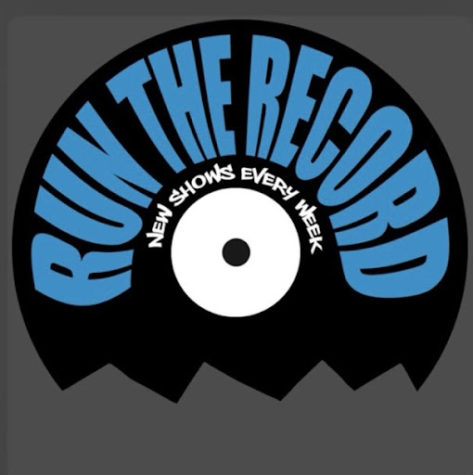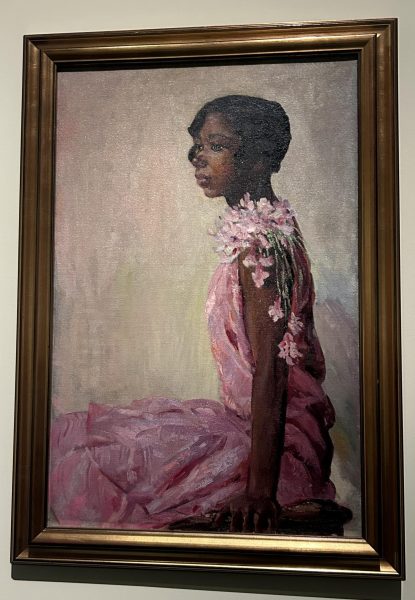The Poetic Artistry of MF DOOM
Hip-hop is still recovering from the loss of rapper Daniel Dumile last year, but his legacy lives on through his iconic persona, MF DOOM.

A year has passed since the rapper and poet Daniel Dumile, better known as MF DOOM, passed away on October 31st, 2020 at the age of 49.
Over a year has passed since the rapper and poet Daniel Dumile, better known as MF DOOM, passed away on October 31st, 2020 at the age of 49. His wife, Jasmine Dumile, announced his death to fans on New Year’s Eve but chose not to disclose the cause of death. Fans and popular artists on the rap scene mourned the loss of his iconic production style, clever rhyme schemes, and his comical persona.
Often referred to as “Your rapper’s favorite rapper,” MF DOOM’s reputation has spoken for itself by the number of rappers who have drawn influence from his style. Upon the announcement of his death, a myriad of artists came forward to pay homage to the masked legend.
“Safe travels,” Tyler the Creator tweeted; Another rapper, JPEGMAFIA, wrote, “I wanted to be like DOOM ALLCAPSNOSPACES…I wish we could have met.”
Farhan Sreejan ’23 is one of many MF DOOM appreciators: “DOOM made good music, and other rappers in the game respected that.” Sreejan hosts a podcast called “Run The Record” which he uses as an outlet to express his love for music and to contribute to modern music discourse. Each week, he and his co-host Daniel Loyola discuss newly released music. Sreejan said, “Doom has always been influential, I believe. Even during his prime, he was influencing others around him.”

The man behind the mask, Daniel Dumile, was born in Hounslow, London, on July 13, 1971 to a Trinidadian mother and a Zimbabwean father. Dumile was raised in Long Beach, New York, and although he remained a British citizen, he found no connection to British culture. Even until his death in 2020, Dumile was not considered an American citizen — he was deported by the U.S. Immigration and Customs Enforcement by the Obama administration in 2010 and was denied reentry.
Dumile’s early life influenced much of his rap career; he had a vast collection of comic books, enjoyed DJing, and had been given the nickname “Doom” which was a phonetic play on his last name, Dumile. His love for comics would later develop into his most famous persona, MF DOOM or Metal Face Doom.
Before he was MF DOOM, Dumile had adopted the name Zev Love X. In 1988, he formed hip-hop group KMD with his brother, DJ Subroc, and Rodan. The three had earned a record deal with Elektra Records from their feature on the track “The Gas Face,” a song by 3rd Bass on The Cactus Album. Following Rodan’s leave to finish school, KMD worked on their debut album Mr. Hood with Rodan’s replacement, Onyx the Birthstone Kid.
The album is reminiscent of the early hip-hop 90s scene, riddled with a diverse sampling of beats and riffs from unconventional sources, overlaid by increasingly complex rhyming schemes. KMD, like many other hip-hop artists at the time, used their music to bring attention to the socio-economic struggles of Black America. In the track “Who Me? (With An Answer From Dr. Bert),” Dumile comments on the representation of Black history in schools: “Holy smokes! I say it’s a joke / To make a mockery of the original folks / Okay jokes over but it still cloaks over / us with no luck from no clover.”
From his beginnings, Dumile’s style as a producer could be seen uniquely developing; in Mr. Hood, Dumile uses snippets from instructional language records and even samples Bert from Sesame Street. In “Who Me? (With An Answer from Dr. Bert),” Bert’s voice sampling instructs KMD to cross out the racist caricature Sambo: “Kids, pick up a crayon, look for (Little Sambo) / When you find him, draw a circle around him.” Dumile’s humorous and creative sampling for mini skits in his music would eventually characterize his comical style throughout his discography.
My favorite track on KMD’s Mr. Hood is “808 Man,” in which Dumile includes a heavy bass line that induces intense head bopping. Dumile’s lyricism details a night out with the other members of KMD in New York. It starts out with them on the train in Brooklyn and quickly descends into a night of mayhem. Dumile outlines the teachings of his very first, but not last persona, ‘Mr. Hood’ in these lines: “Lesson one, if a sucker tries to come, let him come/ By then, the hood was up on me/ Lesson two was to recite the words, you can’t do me none / even though you might be bluffin’, it’s nothing.” Even the rhyming scheme establishes Dumile as one of a kind as a little internal rhyming is sprinkled throughout the album. “His rhyme scheme is incredible,” Sreejan said. “I think he just used a thesaurus while writing his lyrics, which makes for really interesting listening experiences.”
KMD’s next album would lean heavily into political commentary on racism. Dumile would go on to finish the majority of this album by himself after the death of his brother Subroc and the departure of Onyx. Although it was meant to be released by Elektra Records in 1994, the album was dropped due to controversial content.
The rejection of this album and his brother’s death would send Dumile into an onerous three year hiatus. He would eventually find himself homeless, filled with despair and loss, and sleeping on benches in Manhattan. In the latter part of the 90s, he attempted a fresh start in Atlanta, Georgia, and swore to make a comeback.
And Dumile did just that with his iconic persona, MF DOOM. What started out as Dumile freestyling in open mic events in Manhattan, with a set of tights obscuring his face, soon evolved to a full length album and mask akin to that of the Marvel comic super villain, Doctor Doom.
Dumile’s Operation: Doomsday gracefully embodies his growth from Zev Love X to Metal Face Doom in the form of unique sampling and complex rhyme schemes. He uses the four beats within each bar leaving nothing to waste, consequently boasting his fluidity with language. The album was a perfect debut for DOOM; it was released on October 19th, 1999 by Fondle ‘EM Records and it is still recognized, to this day, as an extremely influential and unconventional success.
Operation: Doomsday’s rhyme schemes are nothing short of spectacular, resembling a stream-of-consciousness flow that often employs complex chains of internal and multi symballiaic rhyme schemes. In the track “Doomsday,” Dumile raps, “On Doomsday/ Ever since the womb, ‘til I’m back where my brother went / That’s what my tomb will say / Right above my government, Dumile / Either unmarked or engraved, hey, who’s to say?” Although MF DOOM risks a consistent storyline in his music to make these complex rhymes, it almost adds to his uniqueness as a composer. The inconsistencies create a cartoonish, comical aura in his music as he trades in dramatic narratives for humorous short licks of rhymes. Sreejan said, “There are so many subtle references and punchlines that he hides in just a set of lines, whether it is through his intonation, his flow, or through using the instrumental of a track as something to rap with, rather than over.”

At the heart of this album are Dumile’s clever references to comic culture. The introduction track to Operation: Doomsday is made up of sample snippets of dialogue used to introduce the infamous Metal Face Doom. These short length skits of just dialogue not only add to the comical aura of this album, but also further develops MF DOOM’s persona. He establishes a storyline through these skits while using his tracks to set the cartoonish tone. Dumile’s samples maintain their roots from the early 90s; he samples from Sade, The Beatles, the Scooby Doo Theme Song, and from niche science-fiction movies from the 60s. His sampling of the last few seconds of The Beatles’ “Glass Onion” on the track “Tick, Tick” is a perfect example of Dumile’s ear for good production. “I think also at the time, he had crazy beat selection,” Sreejan adds. “No one would ever have been able to predict that DOOM’s music would age as well as it has, and although Madlib and other contributors definitely are part of the reason for that, DOOM made sure to pick beats that would stand the test of time.”
MF DOOM’s collaboration with producer Madlib on the album Madvilliany would go on to be one of the most renowned records in rap, coming in at #365 on Rolling Stone’s 500 Greatest Albums Of All Time. Madvilliany is a rare album in that it has both Madlib’s superb production and MF DOOM’s lyricism. The album is a testament to their excellent dynamic, as Madlib produced excellent beats for MF DOOM to use to showcase his complex rhyme schemes. In the song “Figaro,” MF DOOM rhymes almost every syllable in each line. In “The Illest Villains,” they pay homage to MF DOOM’s essential sampling work on Operation: Doomsday, which had samples that were merged together from antiquated horror movies from the 60s. In one of the most popular lines from the track “Accordion,” Dumile raps, “Living off borrowed time, the clock ticks faster.” The most distinctive feature of Madvilliany is that each track contains no choruses or hooks. The sampling on the album is just as diverse as MFDOOM’s other projects including American artists, Indian (“Shadows of Tomorrow ” samples “Hindu Hoon Main Na Musalman ”), and Brazilian records.
Sreejan’s favorite album is MMM…FOOD, “[It] is one of those records that I can just put on and let play whether it’s just something that I can have in the background while doing work, or something that I want to actively listen to.” MMM… FOOD would go on to be MF DOOM’s fifth studio album, released by Rhymesayers in November 2004. It is an album in which every track references different foods, but even though Dumile uses food related metaphors in each track, he doesn’t bombard us with profound lyrics. The album is a great conceptual album and is emblematic of MF DOOM’s persona: food, comics, and humor. Complex even went on to name the track “Rapp Snitch Knishes” as the 22nd funniest rap song of all time.
Sreejan speculates as to why MF DOOM remains so influential to this day. “DOOM is a very deep artist. His outreach and his records are prevalent across many facets of underground hip hop discourse online, and he is by far one of the most interesting artists to discuss. He’s not a one-dimensional artist; you can discuss his work from many different perspectives.” People like Farhan Sreejan keep artists like MF DOOM alive even after they have passed on.
If you would like to listen to Farhan Sreejan ’23 podcast, ‘Run the Record,’ click HERE.
If you would like to listen to ‘The Essential MF DOOM playlist on Spotify (subscription required), click HERE.
Farhan Sreejan ’23 is one of many MF DOOM appreciators: “DOOM made good music, and other rappers in the game respected that.”
Karishma Ramkarran is an Editor-in-Chief for ‘The Observatory’ yearbook and a Staff Reporter for 'The Science Survey' newspaper. She appreciates journalistic...










